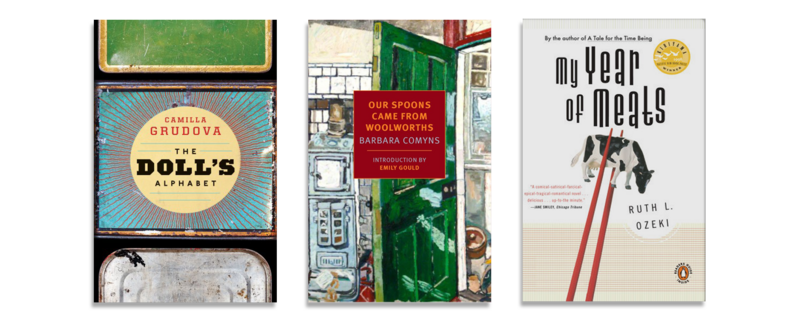Read This Next: Celia Recommends (September)

I hadn’t realized until looking over my reading lists that I really love books about reproduction and childbirth. It’s not that I particularly like children (I don’t), but because pregnancy is sort of the ultimate body horror. The body changes, unpredictably, in service to someone else. I find this, whether presented as an anxiety or a desire, extraordinarily compelling. The following are three books I read this year that I adored, and I found their discussion of pregnancy and children nuanced and absorbing.
The Doll’s Alphabet
Camilla Grudova
Coffee House Press, October 2017
Fiction/Short Stories
I fell in love with Camilla Grudova when I read “Waxy” in Granta in September last year (what a long time this post has been in coming), a remarkable short story from her debut collection, The Doll’s Alphabet. Grudova’s stories are interlinked, taking place in similar worlds, if not the same one, and her collection focuses on women living in misogynistic, isolated societies in utterly grim conditions. Pregnancy is a major theme and a pervasive anxiety in these stories, represented darkly. Women give birth, alone, to otherworldly babies and other things less human.
Comparisons to Atwood and Orwell are inevitable, but unlike June and Winston, Grudova’s women do not imagine worlds outside of their confinements. Their frank acceptance of their circumstances, and of the constraints placed on their bodily autonomy, are part of the horror of this universe. Buy now»
Our Spoons Came From Woolworths
Barbara Comyns
NYRB Classics, 2015
Fiction
Originally published in 1950, Spoons is the deeply personal narrative of a young woman’s early marriage to an artist in London during the Depression. What initially seems charming and bohemian quickly becomes horrible—there is nothing romantic about being starving and pregnant. Sophia is unable to disentangle herself and her children from her husband who refuses to work, and she has few options as a middle-class woman in the 1930s.
Much of the book is dedicated to childbirth and childrearing. Like Grudova, Comyn’s vision is grim, but made all the more horrible by the realistic portrayal of medical care. Unlike the women of The Doll’s Alphabet, Sophia has access to medical care but her doctors and nurses are unfeeling and often cruel. She doesn’t understand what is happening to her body, nor does she have any knowledge of or desire for raising children. Her understanding of birth control is wishing to not get pregnant, and she encounters no one who cares enough to explain it to her. Buy now»
My Year of Meats
Ruth Ozeki
Penguin Books, 1999
Fiction
Ozeki’s debut novel explores the cultural and sexual politics of meat through two narrators, split by passages from Sei Shonagan’s masterpiece, The Pillow Book. Documentarian Jane Takagi-Little travels around the United States working on the docu-series My American Wife!, created by the mysterious company BEEF-EX to promote meat exports to Japan. Japanese housewife Akiko watches the series and replicates the recipes at the orders of her husband, an employee of BEEF-EX.
Jane becomes increasingly skeptical of the show’s premise, especially as she discovers the disturbing side effects of the hormones used to increase cattle growth, and begins to bring the show in a new direction. Difficult pregnancies run in Jane’s family, and her infertility is a recurrent issue—it has complicated and destroyed past relationships and continues to affect her life and work. Akiko, inspired by Jane’s subterfuge, begins to resist her husband’s demands as she realizes another life is possible. Buy now»